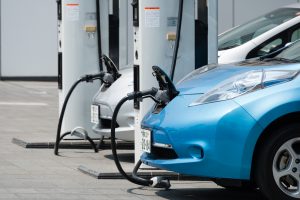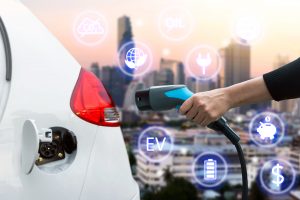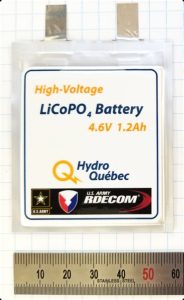 Lithium-ion batteries play a major role in our everyday lives; they’re in our cell phones, solar panels, tablets, cars, and medical devices, to name a few. All these modern technologies are made possible because of batteries. Yet, they’re far from perfect. The Samsung Note 7 self-combusted on nightstands and planes in 2016, injuring customers and causing second-degree burns in one Florida man. Not to mention, the hoverboard’s explosion around the same time, causing a recall of roughly 16,000 hoverboards.
Lithium-ion batteries play a major role in our everyday lives; they’re in our cell phones, solar panels, tablets, cars, and medical devices, to name a few. All these modern technologies are made possible because of batteries. Yet, they’re far from perfect. The Samsung Note 7 self-combusted on nightstands and planes in 2016, injuring customers and causing second-degree burns in one Florida man. Not to mention, the hoverboard’s explosion around the same time, causing a recall of roughly 16,000 hoverboards.
 Electric vehicles don’t only move people, they move companies too. And Volkswagen is making big moves when it comes to investing in battery-powered vehicles.
Electric vehicles don’t only move people, they move companies too. And Volkswagen is making big moves when it comes to investing in battery-powered vehicles.
According to an article in AXIOS written by Eric Wachsman, director of the Maryland Energy Innovation Institute at the University of Maryland, founder of Ion Storage Systems, and 3rd vice president of the ECS board of directors, in June alone, Volkswagen invested $100 million in QuantumScape, a solid state battery startup. And now, the car company is considering building a factory in Europe to produce solid state batteries, a next-generation battery technology, to power their electric vehicles. Volkswagen isn’t alone. Solid-electrolyte batteries are getting international attention from companies like Toyota, Nissan, Dyson, and BMW, who’ve all made similar investments. (more…)
 In 1888, German inventor Andreas Flocken created what is widely considered the world’s first electric car. According to The Battery Issue, recently published by The Verge, the 900-pound vehicle drove at the top speed of nine miles per hour, coming to a halt after a two and a half hour test ride. Although it was considered a success, it wasn’t entirely. The car’s battery, sustainably charged with water power, had died.
In 1888, German inventor Andreas Flocken created what is widely considered the world’s first electric car. According to The Battery Issue, recently published by The Verge, the 900-pound vehicle drove at the top speed of nine miles per hour, coming to a halt after a two and a half hour test ride. Although it was considered a success, it wasn’t entirely. The car’s battery, sustainably charged with water power, had died.
Today, nearly 130 years, German carmakers are still having trouble with their batteries – specifically with battery cells. As a result, car companies are relying on suppliers from China, Korea, and Japan for the highly needed component.
“Cells can be a major technology differentiator and cells are the by far most costly part of the battery pack,” says Martin Winter, a professor of materials science, energy, and electrochemistry at the University of Münster and ECS Battery Division and Europe Section member. Winter says a large scale production of battery cells by European or German companies will be crucial in order to take part in the “enormous and rapidly growing market.”
 For the legendary actor Alan Alda, it was the same curiosity that drew him into acting that propelled him into the world of science.
For the legendary actor Alan Alda, it was the same curiosity that drew him into acting that propelled him into the world of science.
“I remember as a kid always trying to figure out why things were the way they were. How they got to be the way that they were,” says Alda. He was fascinated with the world around him, from examining a flame at the end of a candle to contemplating human behavior. “Why did adults say the things they said and why they behave the way they did?”
Then, an opportunity arose that mixed a little bit of each world. Alda was asked to host the television show Scientific American Frontiers. A show that discussed new technologies and discoveries in science and medicine.
“I said ‘yes’ on the condition I could actually interview the scientists and not just read a narration,” says Alda, “because I really wanted to hear from the scientists about their work. And I wanted to understand it better. That kind of lead to what I do now which is to help scientists communicate better.”
 According to the Georgia Institute of Technology, crab shells and trees may soon replace the flexible plastic packaging used to keep food fresh. The innovative process involves spraying multiple layers of chitin from crab shells and cellulose from trees to form a flexible film similar to plastic packaging film. Once fully dried, the material is flexible, strong, transparent, and compostable.
According to the Georgia Institute of Technology, crab shells and trees may soon replace the flexible plastic packaging used to keep food fresh. The innovative process involves spraying multiple layers of chitin from crab shells and cellulose from trees to form a flexible film similar to plastic packaging film. Once fully dried, the material is flexible, strong, transparent, and compostable.
Not only will these lifeforms become a source of sustainable and renewable wrapping, but they will also help improve food quality. Compared to conventional plastic packaging, the new technology offers a 67 percent reduction in oxygen permeability, allowing food to stay fresh even longer.
(Eric Wachsman will be presenting Safe, High-Energy-Density, Solid-State Li Batteries at AiMES 2018 in Cancun, Mexico on October 1, 2018.)
Behind the wheel of a ’68 Dodge Charger, Eric Wachsman discovered his passion for clean energy technology. He was a teenage boy in high school, and the open road was calling out to him.
“I just lived for cars,” says Wachsman, who serves on the ECS board of directors. “I could not wait to get my first car.”
So when he hit the road in his $1,500 hot rod, loaded with a holley double pumper carburetor, headers. “You name it.” He was thrilled. “That thing was the fastest thing around.”
However, life on the road soon came to a screeching halt.
 Nineteen sixty-eight marked a year of tragedy but also of transformation. It may be 50 years in our past, but what occurred that year is still very much alive with us today. Here are our top 5 reasons why the scientific advances of that year are super “groovy” in our book:
Nineteen sixty-eight marked a year of tragedy but also of transformation. It may be 50 years in our past, but what occurred that year is still very much alive with us today. Here are our top 5 reasons why the scientific advances of that year are super “groovy” in our book:
5. Patent for the jacuzzi whirlpool hot tub granted
Roy Jacuzzi realized early on that the market for leisure and fitness was a growing one. He set out to create a bathtub that allowed enough room to offer “a relaxing soak,” according to Jacuzzi Inc.’s company history page. With that, the first bathtub with a built-in whirlpool system was born. The laid-back culture of California in the 1970s turned out to be the perfect launching ground for the now widely appreciated and known jacuzzi.
4. Apollo 8 is the first manned spacecraft to orbit the moon
Jim Lovell, Bill Anders, and Frank Borman became the first human beings to orbit another world. According to NASA, on Christmas Eve 1968 the three men were the first to orbit the moon and see Earth as a whole planet. With that, Jim Lovell confirmed, “there is a Santa Claus.”
Reddit’s “Ask Me Anything” Demise an Upset to Science Community
Posted on July 13, 2018 by Jennifer Quartararo An online platform that had once offered a voice to scientists – to join in on debates and discussions of other scientists and inquisitive minds – may now be a thing of the past. Social news website Reddit hosts r/science, one of the world’s largest online science communities, which ran a popular Ask Me Anything Q&A (AMA) series that picked the brains of academics about topics like climate change, physics, and astronomy has come to an end. This was all due to a change in Reddit’s algorithm, changing how posts were ranked and making it nearly impossible to compete with the charm of cute animal GIF’s in the competition of upvotes.
An online platform that had once offered a voice to scientists – to join in on debates and discussions of other scientists and inquisitive minds – may now be a thing of the past. Social news website Reddit hosts r/science, one of the world’s largest online science communities, which ran a popular Ask Me Anything Q&A (AMA) series that picked the brains of academics about topics like climate change, physics, and astronomy has come to an end. This was all due to a change in Reddit’s algorithm, changing how posts were ranked and making it nearly impossible to compete with the charm of cute animal GIF’s in the competition of upvotes.
The demise of the Ask Me Anything Q&A series is considered a major setback for the science community. The forum grew to nearly 19 million users, now left with no other platform that offers quite the same reach, accessibility, and engagement.
“With flat-earthers, anti-vaxxers, climate change deniers, and the rest of the anti-science brigade making their views heard in almost every corner of the internet, it’s a difficult time for those who value insightful discussion of peer-reviewed science online,” says Alastair McCloskey, a digital content coordinator in the Faculty of Social Sciences at the University of Sheffield. Read his full article here.
Hydro-Québec (an ECS institutional member) and the U.S. Army Research Laboratory have announced a breakthrough in the lithium-ion battery materials field, publishing their research results in the Journal of Power Sources. Using a cathode made with new high voltage safe materials, the researchers have achieved a world first: building a 1.2 Ah lithium-ion cell with a voltage of 5 V.
“With the high voltage of this new cell, we can reach a very high energy density,” says Karim Zaghib, General Director of the Center of Excellence in Transportation Electrification and Energy Storage. “This highly desirable property can improve batteries used in a wide range of applications.” Army Research Laboratory scientists Jan Allen and Richard Jow, also inventors of this high voltage cathode material, believe that the high cell voltage can, in addition to enabling high energy density, improve the design of devices.
Lithium-ion batteries are widely used to power many electronic devices, including smartphones, medical devices and electric vehicles. Their high energy density, excellent durability and lightness make them a popular choice for energy storage. In response to the growing demand for their use in a wide range of products, there are many teams working to improve their storage capacity. In particular, there is great interest in developing new compounds that could increase energy storage capacity, stability and lifespan. That is why the innovation announced today has such a strong commercial potential.
Sustainability is at the core of the research that is published in the ECS Digital Library. Electrochemists and solid state scientists and engineers are our best hope of developing the technologies that will make a difference. They are the masterminds behind the lithium batteries that run all of our mobile devices, they developed the first fuel cells and photovoltaics, and they are on the cutting edge of current research in generating and storing energy from renewable sources like solar, biofuels, even waste papaya and tomatoes. From creating more efficient systems to discovering new energy sources, electrochemists and solid state scientists are behind the most critical innovations in sustainability and renewable energy. That is why, we at ECS are excited to celebrate Earth Day this weekend.
If you still need ideas on how to spend the day, here are the top five things to do:
1. Volunteer
Help clean up a local park, beach, or river! What better way to show your appreciate for the Earth than to help her look her best? This will also help ensure the local plants and animals live a healthier life. Electrochemists and solid state scientists and engineers are tackling waste and improving living conditions around the world through novel reuse systems.
ECS member, Dr. Boryann Liaw has turned waste papaya into sugar-air batteries. Electrochemists are turning food waste like tomatoes and bread mold into energy sources for batteries and fuel cells.




